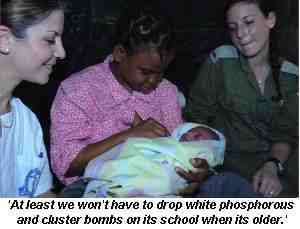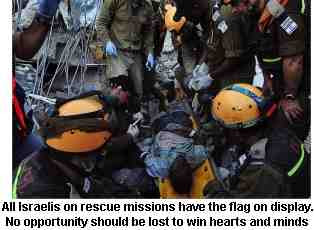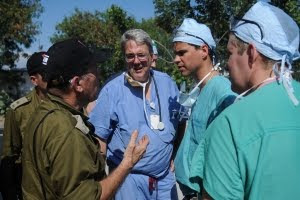The Cynicism of Israel’s PR Aid to Haiti
Is Israel’s help in Haiti really useful or a gigantic PR exercise asks Sol Salbe, the translater of the item below? As he notes, Yoel Donchin is a good person to answer the question. Prof Donchin is the director of the Patient Safety Unit at the Hadassah Medical Centre in Jerusalem. His patriotism cannot be questioned he has served on most of Israel’s disaster relief missions. For his verdict read on. Naturally this item was meant for Israelis only, it was only published in Ynet but not Ynetnews and translated by this News Service.]
In fact the answer cannot be anything other than yes. After the United States, in the last 30 years, the State which has caused most devastation and loss of life in Central and South America has been Israel. When the US couldn’t for reasons of domestic opposition, supply weapons to particular regimes, as was the case with Guatemala during the Carter years and likewise Nicaragua under Somoza, who stepped into the breach? Israel.
It is clear from this article that Israel missions to disaster areas like Haiti stay there only as long as the cameras are their to record their stalwart efforts. And the two weeks quoted in the article is cynical even given the example that the US itself sets, where restoring ‘public order’ that is a dictatorship is seen as more important than providing aid.
If Israel is really concerned about saving life then they can allow medicine into Gaza, allow the rebuilding of the destroyed buildings, lift the siege, pledge never to drop phosphorous bombs, fleschettes or cluster bombs where children might find them and stop turning sick people away from their check points or delaying them until death.
Haiti demonstrates, in all its terrible reality, the naked truth about US relations with its neighbours. The US has commandeered Haiti’s only airport, and is barring aid missions in order that it can land troops and supplies for them! Such is the barbarism of imperialism’s dominant state at the beginning of the 21st century.
Tony Greenstein
Public Relations instead of saving lives
Sending portable toilets to Haiti would have been a better option, but this does not provide good photo opportunities.
Israeli missions to disaster areas in the past have shown that such activity was in vain.
Yoel Donchin
I received my final exemption from the army after I published an article which said that the State of Israel acts like the proverbial Boy Scout, who insists on doing a good deed daily and helping an old lady cross the road even against her will. How ungrateful of me to publish such a column when I had participated in almost all the rescue missions to overseas disaster areas! Suddenly I am no longer suitable to take part in such heroic endeavours. But in light of the experience I gained in such missions, my conclusion is that we have wasted our effort.
Generally speaking, we start preparing for such a mission within hours of the announcement of a natural disaster. Most often the Israeli mission team is the first one to land in the area. Like those who climb Mount Everest, it plants its flag on the highest peak available, announcing to all and sundry that the site has been conquered. And in order to ensure that the public is aware of this sporting achievement, the mission is accompanied by media representatives, photographers, an IDF spokesman’s office squad and others.
I understood the purpose perfectly when the head of one of the delegations to a disaster zone was asked whether oxygen tanks and a number of doctors could be removed to make room for another TV network’s representatives with their equipment. (With unusual courage, the delegation head refused!)
The lesson learnt from the activities of those missions is that when there is a natural disaster, or when thousands of people are expelled from their homes by force, as happened in Kosovo, survivors may benefit from international assistance only if it responds to the region’s specific needs. Also assistance must be coordinated among the various aid agencies.
The competitive race to a disaster zone imposes a huge strain on the local health and administration authorities. Airports are clogged by transport planes unloading a lot of unnecessary but bulky equipment. Doctors and rescue organisations seek ways to utilise single carriageway roads and in fact they are a burden.
The correct way to help is to send a small advance force to gauge the dimensions of the disaster. Which infrastructures are still standing? Would sending a field hospital with all its components not overload the road system, or other infrastructure?
Would they still call that child Israel?
Three components are crucial:
shelter, water and food — these things are crucial in order to save the largest number of people. Water purification equipment, tents, basic food rations are needed. But they do lack the desired dramatic effect. If we went down that track we would miss out on seeing that child who was born with the assistance of our physicians. Most certainly, the excited mother wouldn’t give her child (who knows if he will ever reach a ripe old age?) the name Israel or that of the obstetrician or nurse. (Would he get citizenship because he was born in Israeli territory? There would be many opposed to that.) The drama is indeed classy, but its necessity is doubtful.
It would be far more appropriate to send a limited force to faraway regions. It being Israel, our current force contains a Kashrut supervisor, security personnel and more.
In the present disaster, which is of a more massive scale than anything we have encountered to date, the need is not so much for a field hospital but field, ie portable, toilets. There is more of a need for digging equipment to dig graves and sewerage pipes.
A country which wants to provide humanitarian aid without concern for its media image should send whatever is required by the victims, and not whatever it wants to deliver. But would the evening news show the commander of the Israeli mission at the compound with 500 chemical toilets? Unlikely. It is much more media savvy to show an Israeli hospital, replete with stars
of David and of course the dedicated doctors and nurses, dressed in their snazzy uniforms with an Israeli flag on the lapel.
Does Israel have to enlist in the campaign and mobilise substantial resources to reach remote places thousands of kilometres away? If Israel does see providing humanitarian aid as part of its national character, if we see added value in having representatives on the ground in such places, it would be better to plan it in advance. It would be better to set a team of experts for such mega disasters who can decide what assistance should be sent depending on what is required and the means to deliver it.
It is quite likely that financial assistance commensurate with Israel’s resources would be preferable to the enormous expense and complicated logistics involved in the maintenance of a medical unit in the field. It is possible and desirable to assist in a different way.
But apparently a minute of TV coverage is much more important than all other considerations, and in fact Israel is using disasters as field training in rescue and medical care. After a fortnight, the mission will reportedly return to Israel. But to be truly effective a field hospital needs to remain for two or three months, but that’s a condition that Israel cannot meet.
Meanwhile, it is only in the Israeli aid compound in Haiti that large signs carrying the donor country’s name hang for all to see.
Prof Yoel Donchin is the director of the Patient Safety Unit at the Hadassah Medical Centre in Jerusalem. Translated by Sol Salbe. Hebrew original: http://www.ynet.co.il/articles/0,7340,L-3836494,00.html
The independent Middle East News Service concentrates on providing alternative information chiefly from Israeli sources. It is sponsored by the Australian Jewish Democratic Society. The views expressed here are not necessarily those of the AJDS. These are expressed in its own statements Please note that while our own comments are not copyrighted we do appreciate acknowledgement. Items forwarded may be copyrighted and are forwarded to alert you of their existence. To subscribe write to [email protected]]



